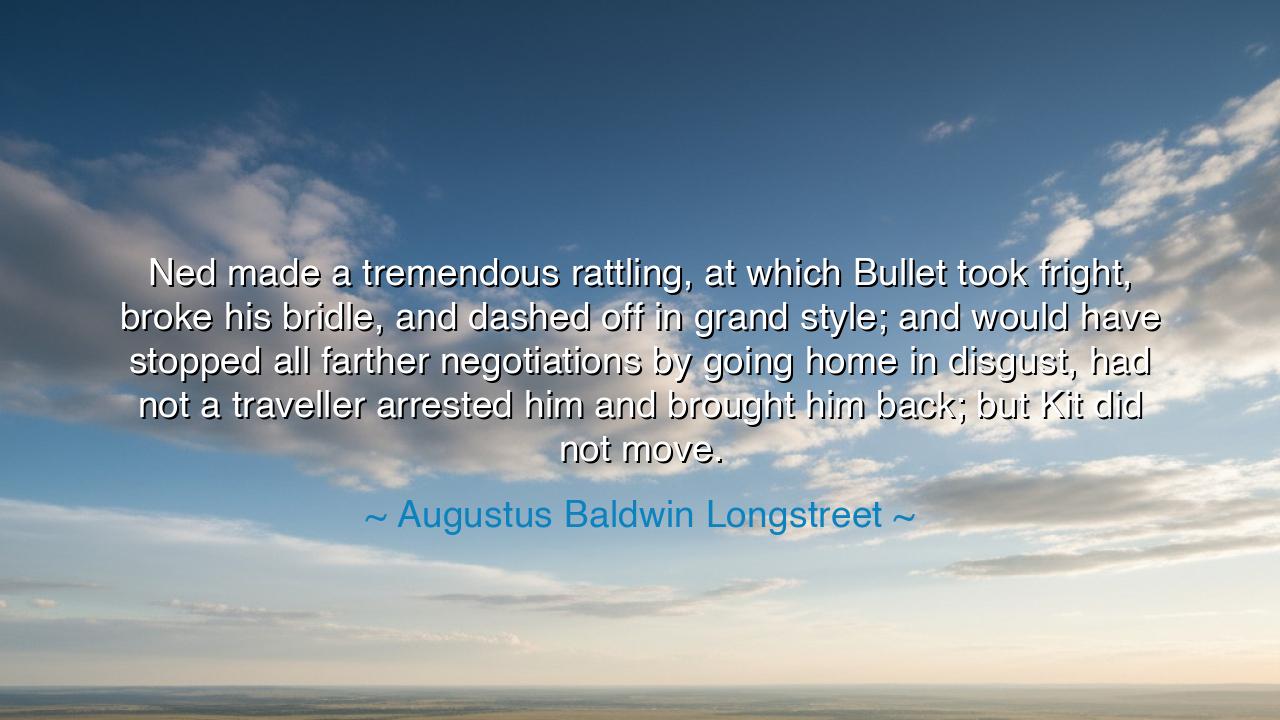
Ned made a tremendous rattling, at which Bullet took fright
Ned made a tremendous rattling, at which Bullet took fright, broke his bridle, and dashed off in grand style; and would have stopped all farther negotiations by going home in disgust, had not a traveller arrested him and brought him back; but Kit did not move.






Hear now the vivid and curious words of Augustus Baldwin Longstreet, who wrote: “Ned made a tremendous rattling, at which Bullet took fright, broke his bridle, and dashed off in grand style; and would have stopped all farther negotiations by going home in disgust, had not a traveller arrested him and brought him back; but Kit did not move.” Though drawn from a tale of humor and rustic adventure, these words carry a wisdom both subtle and profound. Beneath the lively motion of horses and men lies a parable of temperament, steadfastness, and the differing ways in which beings respond to the storms of the world.
The origin of this quote comes from Longstreet’s Georgia Scenes (1835), a collection of sketches that painted the life and character of the early American South. Through his tales, he captured not only the dialects and mannerisms of frontier life but also the deeper moral lessons hidden within the ordinary. This passage tells of two horses—Bullet, spirited and impulsive, and Kit, calm and steady—each a reflection of human nature itself. When Ned’s noise startled them, Bullet panicked and fled, while Kit stood firm, unmoved by the commotion. Longstreet, though telling a tale of humor, whispers through it an eternal truth: that the world is full of Bullets and Kits—those who lose themselves in fear, and those who endure in stillness.
In every age, there are those who, like Bullet, are governed by instinct rather than reason. When faced with sudden noise—the noise of change, of crisis, of uncertainty—they break their bridle and flee toward the comfort of the familiar. They seek escape rather than understanding, mistaking flight for freedom. But the wise among us, the Kits of the world, remain rooted. They observe before they react; they understand that not every rattling signifies danger. Such patience is not weakness—it is inner strength, the mark of one who trusts in both themselves and the order of things.
The ancients, too, spoke of this distinction. When Socrates stood accused before the Athenian court, surrounded by noise, accusation, and scorn, he did not flee. He remained unmoved, his heart steady in the face of fear. Like Kit, he did not run when others would have. His courage was not in defiance, but in composure—a calm rooted in principle, not pride. Meanwhile, many who once called themselves his friends turned like Bullet, breaking their ties and retreating from the danger of association. Thus, from the stables of the South to the halls of Athens, the truth resounds the same: those who are ruled by impulse scatter, but those anchored in conviction stand firm.
In this story, Longstreet hides another lesson—the power of restraint in a world of reaction. The one who flees from noise often creates greater chaos than the noise itself. Bullet’s panic would have ended the journey entirely had not a stranger intervened. And so it is in life: when fear drives our steps, we often undo our own progress, needing others to return us to the path we abandoned. But when we, like Kit, remain unmoved, we become the quiet axis around which order turns. Stillness, rightly understood, is not stagnation—it is mastery of the self.
There is also a humbler wisdom in the figure of the traveller who caught Bullet and brought him back. For not all who falter are lost forever. Even those who flee in fear may return, guided by the steady hands of others. Thus, the tale teaches compassion for the frightened and patience for the rash. The world needs its Bullets and its Kits, its restless and its steadfast alike, for each reveals the other’s nature. What matters is that one learns from experience—that the next time the rattling comes, one pauses, breathes, and remembers the cost of unbridled haste.
So, my children, take this story to heart. When the world around you trembles with noise—when change, fear, or challenge rattle your soul—choose not the path of panic, but of presence. Let others stampede if they must; you need only stand your ground, calm as Kit, until the air clears and wisdom returns. The strong are not those who never tremble, but those who do not run from their trembling. And when others lose their way, be like the traveller—steady, kind, and capable of leading them home.
For in the tale of Ned, Bullet, and Kit, Augustus Baldwin Longstreet has given us not merely a story of horses, but a mirror of humanity. The noise of life will come to all of us, sometimes suddenly, sometimes fiercely. But those who master the art of stillness will find that the world itself bends toward their calm. Remember, then: it is not the loud who lead, but the steady who endure.






AAdministratorAdministrator
Welcome, honored guests. Please leave a comment, we will respond soon